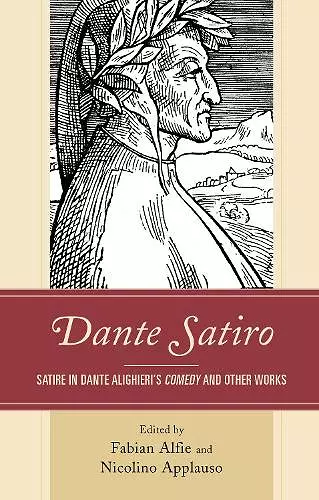Dante Satiro
Satire in Dante Alighieri's Comedy and Other Works
Fabian Alfie editor Nicolino Applauso editor
Format:Paperback
Publisher:Lexington Books
Published:21st Dec '21
Should be back in stock very soon
This paperback is available in another edition too:
- Hardback£90.00(9781793621719)

This collection of essays is the first comprehensive study on Dante and satire within his entire corpus that has been published. Its title evokes the moment when Virgil leads Dante through Limbo, the uppermost portion of Hell. There, they are joined by four classical poets, and Virgil describes one of them as “Horace the satirist” (“Orazio satiro,” 4:89). By applying the expression to Dante himself, this volume seeks to explore the satirical elements in his works. Although Dante is not typically described as a satirist, anyone familiar with his works will recognize the strong satirical element in his many writings. Ultimately, this study shows that Dante engages in satire in order to attain the primary literary tool at his disposal for his prophetic objectives: the castigation of vice.
The essays in this volume examine satire in Dante’s Divine Comedy, lyric poetry, and prose works. Alfie (Univ. of Arizona) and Applauso (Loyola Univ. Maryland) understand satire as “the genre dedicated to the reprehension of vice” (p. 3). The editors' introduction will be much appreciated since it both positions the volume within Dante criticism and provides a brief accessible overview of medieval European understandings of satire. The volume is divided into two parts: the first (four essays) focuses on the Comedy, and the second (also four essays) looks at satire in the minor works. Highlights among the essays include a reassessment of Paradiso 27 by Maggie Fritz-Morkin (Univ. of North Carolina at Chapel Hill) and a novel analysis of satire in the De vulgari eloquentia by Anthony Nussmeier (Univ. of Dallas). The volume finishes with a lighthearted essay by Arielle Saiber (Bowdoin College) exploring how Dante has become an enduring reference in modern popular culture and humor. Summing Up: Recommended. Upper-division undergraduates through faculty.
* Choice *A well-rounded study that fleshes out one of the most contemporary aspects of Dante’s work: its use of satire as a means to reprehend vice and establish ethical values. Alfie and Applauso have put together an excellent volume with international reach, probing the classical, medieval, and ever-current aspects of the great poet’s satirical art. From the rotten pit of Hell to the celestial heights of Paradise, Dante spares no one and pulls no punches, targeting popes and emperors in both the Divine Comedy and his other works. Dante Satiro collects captivating readings by top Dante scholars, each of whom offers a compelling analysis of satire from the Middle Ages to its resonances with today’s media satirists: seven hundred years after his death, Dante is alive and well. Indeed, as one contributor to this volume reminds us, we should keep in mind Osip Mandelstam’s words: “It is unthinkable to read the cantos of Dante without aiming them in the direction of the present day … They are missiles for capturing the future.” -- Francesco Ciabattoni, Georgetown University
We all know a lot about Dante “comico” and his style. But on the other hand no one has ever tried to read his works as belonging to satirical genre, as if he used the poetic code as a way to struggle with the vices of his time. This is what Dante Satiro: Satire in Dante Alighieri's Comedy and Other Works is made up of for the first time, not only relating to his masterpiece (the Commedia), but also looking for a satirical tone where it’s not expected, like in the linguistic treaty De vulgari eloquentia, or pointing out his influence on contemporary satire. -- Marco Berisso, University of Ge
ISBN: 9781793621733
Dimensions: 218mm x 155mm x 14mm
Weight: 376g
262 pages